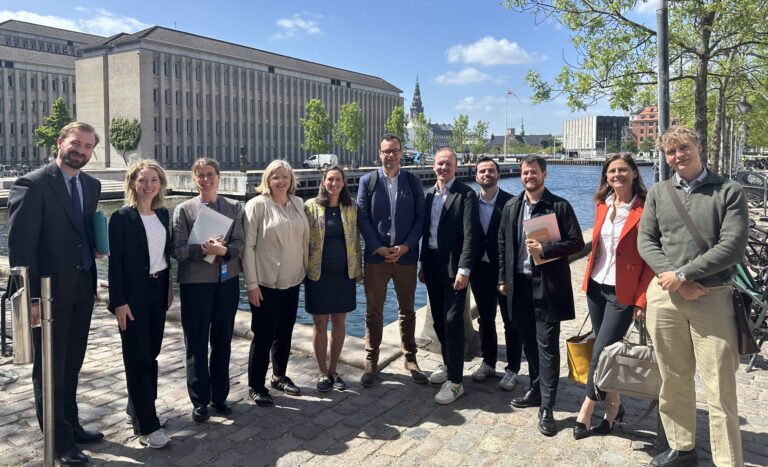Artificial intelligence (AI) is transforming how we work, supporting people, creating new efficiencies, and helping companies of all sizes adapt in an increasingly competitive global economy. From optimising transport logistics to enabling smarter online shopping experiences, and supporting job-matching platforms and employee retention strategies, AI is already making a difference across Europe’s economy.
As discussions emerge in the European Parliament around a possible new initiative on “AI in the workplace”, it’s worth asking: do we really need another layer of legislation, especially before the ink on the AI Act has even dried?
AI is already regulated
The EU has not been idle. Among others, the General Data Protection Regulation (GDPR), the Platform Work Directive (PWD), and now the AI Act (AIA) already provide a strong framework for ensuring trustworthy use of algorithms in the workplace. For instance, many AI applications in HR, from recruitment tools to employee performance monitoring, could be classified as high-risk under the AI Act and face stringent compliance obligations. Rather than rushing into new legislative territory, we should take the time to implement the existing rules effectively, understand their impact, and address interplay and inconsistencies.
Time to focus on implementation, not duplication
European companies are ready to comply, but they also need room to innovate and grow.
Launching a new initiative before the AI Act has even been rolled out would create regulatory overlap, increase uncertainty, and risk undermining Europe’s stated priorities: simplification and competitiveness.
The European Commission has rightly acknowledged that burdensome, fragmented rules can hinder the very innovation we want to encourage. Let’s not forget that global tech competition is intensifying. If Europe is to lead, not just regulate, on AI, we need a smarter, more agile approach.
AI in the workplace: A force for good
AI can help us respond to demographic realities. With aging populations and a shrinking workforce across many Member States. AI offers a powerful tool to augment human work, automate repetitive tasks, and support productivity, without replacing the human element.
Just as importantly, AI can empower workers and strengthen employee retention. Innovative companies are already using AI to better understand their employees’ unique skills and aspirations, offering tailored career paths and enabling horizontal moves within organisations. These tools are about empowerment and development.
Focusing on opportunities, not just risks
Too often, the EU policy debate around AI has been driven by risks, real or perceived, at the expense of recognising the remarkable benefits these technologies bring. We must move past the default assumption that “algorithms are bad”, and instead focus on proportionality, evidence, and opportunity.
Europe’s technology companies are ready to build solutions that reflect our values. But to do so, we must avoid over regulating by default. Let’s give the AI Act a chance to work. Let’s identify genuine gaps through the Commission’s upcoming consultation on high-risk AI. And most of all, let’s ensure that any new steps support, not stifle, Europe’s ability to compete globally.
What’s next ?
Europe’s technology companies are eager to deliver AI solutions that reflect our shared values and improve working lives. The AI Act is a significant milestone, and we now have an opportunity to make it a success by focusing on effective implementation. Before considering new rules, let’s build on this foundation, learn from real-world applications. If gaps are identified, let’s consider new rules in a very targeted and effective way. By staying aligned with the EU’s goals of simplification and competitiveness, we can empower European innovation to thrive, ensuring AI in the workplace becomes a driver of growth, opportunity, and resilience across Europe.
About the European Tech Alliance
EUTA represents leading European tech companies that provide innovative products and services to more than one billion users. Our 33 EUTA member companies from 15 European countries are popular and have earned the trust of consumers. As companies born and bred in Europe, for whom the EU is a crucial market, we have a deep commitment to European citizens and values.
With the right conditions, our companies can strengthen Europe’s resilience and technological autonomy, protect and empower users online, and promote Europe’s values of transparency, rule of law and innovation to the rest of the world.
The EUTA calls for boosting Europe’s tech competitiveness by having an ambitious EU tech strategy to overcome growth obstacles, making a political commitment to clear, targeted and risk-based rules, and enforcing rules consistently to match the globalised market we are in.
For media inquiries, please contact:
Victoria de Posson, EUTA Secretary General
E-mail: victoria@eutechalliance.eu
E-mail: info@eutechalliance.eu
Phone: +32 476 25 08 16
www.eutechalliance.eu




